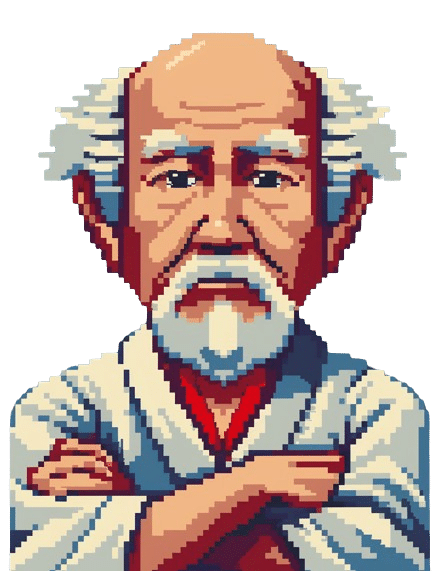Oh, George W. Bush, the maestro of malapropisms! His declaration, 'They misunderestimated me,' perfectly sums up the delightful confusion he brought to the political arena. It's like trying to give a cat a bath – you think you've got it under control, but oh boy, surprise! Bush's journey was a rollercoaster of quirky quotes and unexpected victories, kinda like finding out your cactus has a secret passion for salsa dancing. If you thought that was amusing, just wait until you uncover more about his wild political ride!
Early Life and Political Beginnings
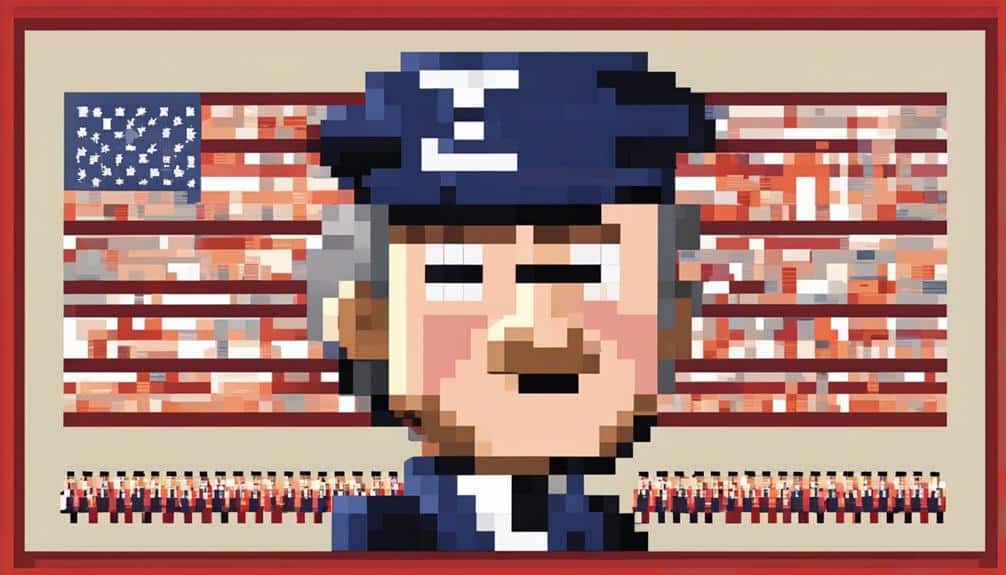
Growing up in Texas, George W. Bush set out on his political path through his father's presidential campaigns, charting the course to his own political career.
Imagine being a young George, maneuvering through the family dinner conversations filled with political jargon and strategic debates. While most kids were playing with action figures, George was probably plotting his next move on the political chessboard. It must have been quite the experience, growing up with the pressure of living up to the Bush family name. But hey, no pressure, right?
As George ventured into the political arena, it seemed like he was destined to follow in his father's footsteps. With a last name like Bush, it's like being born into a political legacy – talk about a head start in the game of politics.
Governor of Texas
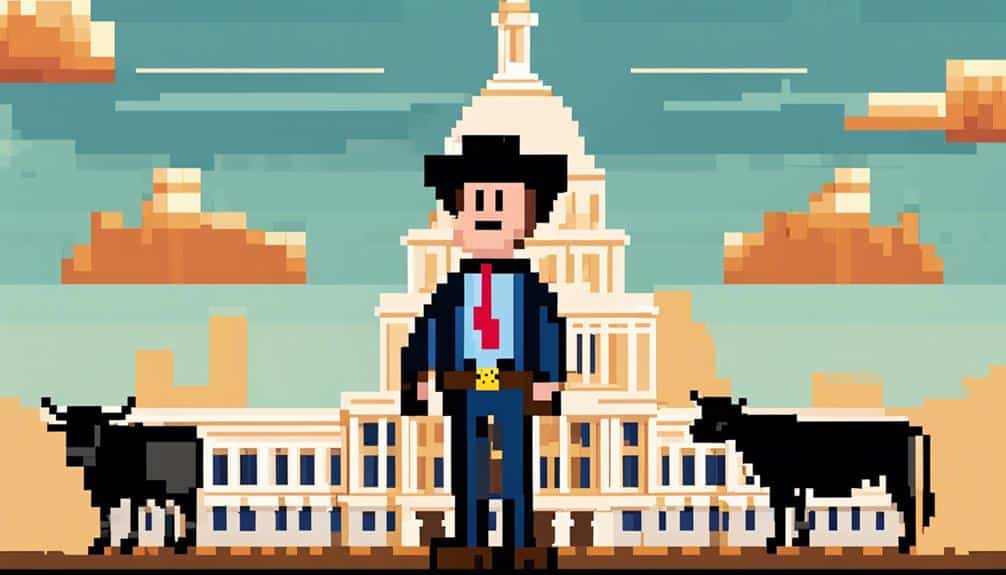
George W. Bush's journey into politics reached a significant milestone when he assumed the role of Governor of Texas, marking a pivotal moment in his political career.
As Governor, you found yourself maneuvering the wild and often unpredictable world of Texas politics – a place where cowboy boots and big hats sometimes seem to hold more power than actual legislation. You quickly learned that in Texas, everything is bigger, including the egos of some politicians.
From handling state budgets to trying to keep the Lone Star State in line, you certainly had your work cut out for you. It was like trying to herd cattle during a rodeo – chaotic, messy, and occasionally ending up with a few surprises.
But through it all, you managed to make a name for yourself, proving that even in a state as vast and varied as Texas, a Bush could hold his own in the political arena.
Presidential Campaign and Election
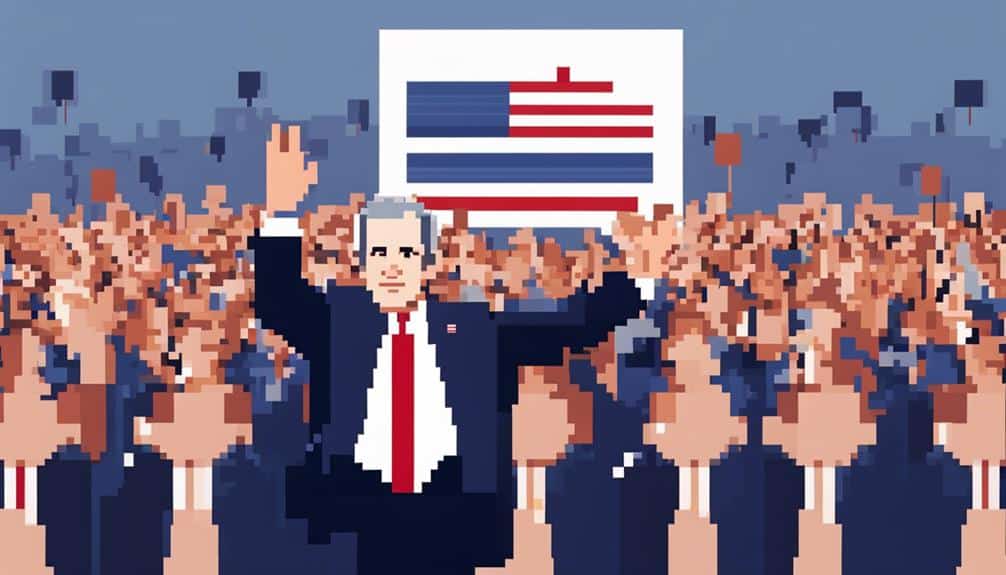
Imagine this: during the 2000 Presidential Campaign, Bush faced challenges that tested his political mettle and strategical prowess. You, yes, you, running for the highest office in the land.
It's not just about kissing babies and making promises you may or may not keep; it's a cutthroat world out there, filled with debates, scandals, and a whole lot of handshaking.
Bush had to navigate through the treacherous waters of American politics, dodging verbal bullets and trying to appear relatable to the average Joe while also pleasing the bigwigs. It's like walking a tightrope, but instead of a safety net, you have the entire nation watching your every move, ready to pounce on any slip-up.
And then, the election day arrived, with the fate of the nation hanging in the balance. Would you emerge victorious, or would your dreams of Oval Office glory come crashing down like a poorly constructed house of cards? Only time would tell.
9/11 Attacks and War on Terror
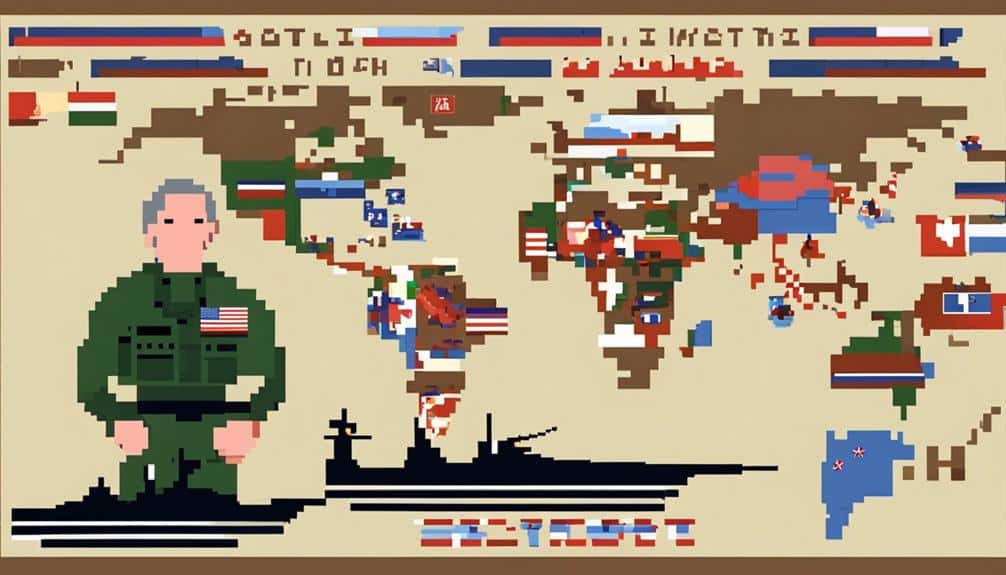
The nation faced a new era of uncertainty and fear following the attacks on September 11, 2001. Suddenly, acronyms like CIA, FBI, and NSA became part of your everyday lingo. You traded in your morning crossword puzzle for deciphering the latest threat level color coded by the Department of Homeland Security. War on Terror? More like war on your peace of mind as you side-eyed every unattended backpack on the subway.
You found yourself nodding along to George W. Bush's speeches, trying to decipher if 'misunderestimated' was a top-secret code word only known to those in the highest echelons of government. The news became a real-life action movie, with Bush playing the lead role of the cowboy president determined to bring the bad guys to justice.
You couldn't help but wonder if this was all a reality show gone wrong, with the world as the unwilling audience.
As the world grappled with this new normal, you couldn't help but feel like you were living in a never-ending sequel nobody asked for, 'Terrorism Strikes Back: The Sequel Nobody Wanted'.
Controversies and Criticisms
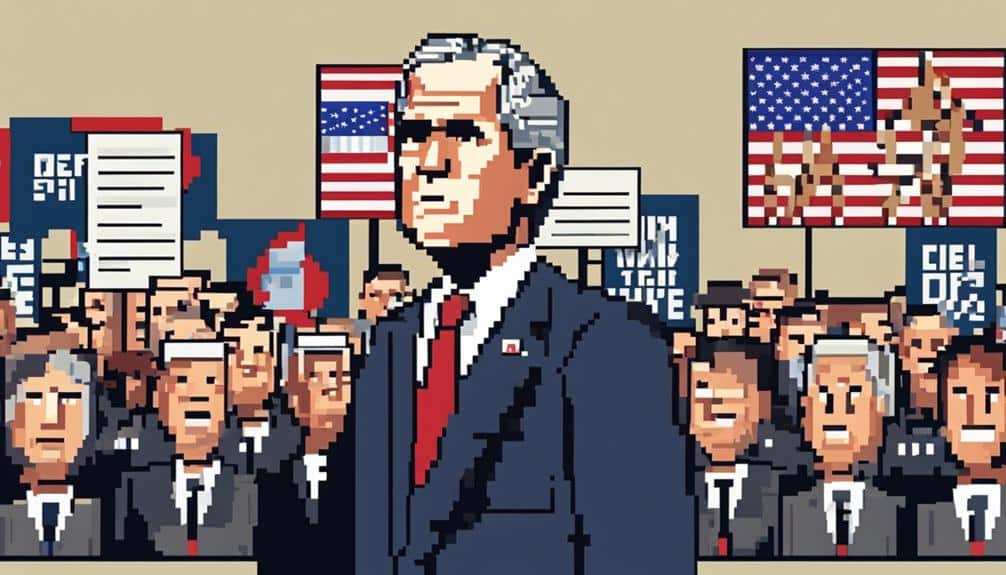
Numerous scandals and objections arose during this tumultuous period, casting shadows on the administration's credibility. From the infamous 'Mission Accomplished' banner prematurely celebrating the end of major combat operations in Iraq to the mishandling of Hurricane Katrina relief efforts, the Bush administration found itself embroiled in a series of controversies that left many scratching their heads in disbelief.
The public outcry over the administration's warrantless wiretapping program and the contentious decision to invade Iraq based on faulty intelligence further fueled the flames of criticism. Critics lambasted the administration for its handling of the economy, with the 2008 financial crisis serving as a stark reminder of the consequences of deregulation and unchecked corporate greed.
The appointment of controversial figures like Dick Cheney and Donald Rumsfeld only added fuel to the fire, with their hawkish tendencies exacerbating tensions both at home and abroad. As the administration struggled to maintain its image amidst mounting scrutiny, the term 'misunderestimation' took on a whole new meaning.
Domestic Policy and Achievements
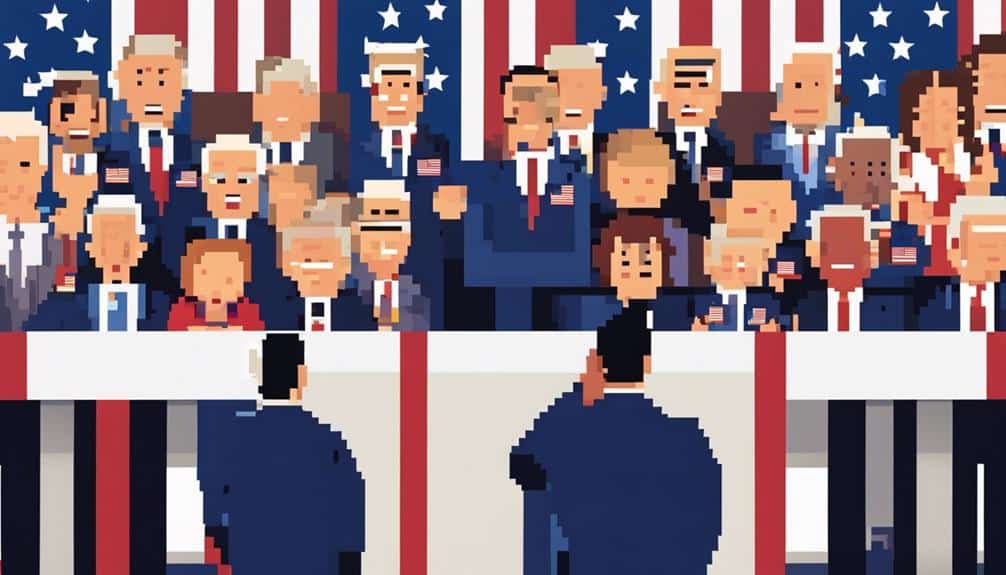
So, you think George W. Bush's domestic policies were just a series of questionable decisions? Think again! His economic reforms had an impact that could make even the stock market blush.
And let's not forget about his education initiatives, which were so successful they put overachievers to shame.
Oh, and did we mention the healthcare improvements under his watch? Let's just say, he had a prescription for success that even Dr. Fauci would approve.
Economic Reforms Impact
Considering the economic reforms implemented during George W. Bush's presidency, significant impacts on domestic policy and achievements are evident.
You might be surprised to learn that Bush's tax cuts in 2001 and 2003 aimed to stimulate economic growth. These cuts, often referred to as 'tax relief,' were like sprinkling fairy dust on the economy, magically making things better – or so the narrative went. However, the fairy tale didn't unfold quite as planned, with critics arguing that the benefits mainly favored the wealthy, leaving the middle class feeling more like the dwarves working away in the mines.
Then came the Medicare Modernization Act of 2003, introducing the prescription drug benefit, like a shiny new toy promising better healthcare for seniors. This act added a new chapter to the healthcare saga, stirring up debates on costs and coverage.
The impact of these economic reforms was akin to a plot twist in a soap opera – unexpected, controversial, and ultimately shaping the domestic policy scenery for years to come.
Education Initiatives Success
The successful implementation of education initiatives during George W. Bush's presidency greatly impacted domestic policy and achievements.
You see, George W. Bush didn't just sit around twiddling his thumbs; he put his thinking cap on and came up with some grand plans for education. His No Child Left Behind Act aimed to improve accountability in schools, ensuring that every student had the opportunity to excel. This policy shook things up, making sure schools were on their toes, working towards better outcomes.
Of course, there were debates about its effectiveness, with some arguing it put too much pressure on teachers and students. But hey, nothing revolutionary comes without a bit of controversy, right?
Bush's focus on education initiatives showed that he cared about the future of the nation, planting the seeds for a generation of learners ready to take on the world. So, love him or hate him, you can't deny that Dubya had some tricks up his sleeve when it came to education.
Healthcare Improvements Under Bush
Healthcare improvements under Bush had a significant impact on domestic policy and achievements, leading to notable changes in the healthcare scene.
You might be surprised to learn that during Bush's presidency, the Medicare Modernization Act was passed, introducing Medicare Part D, which provided prescription drug coverage to seniors. This move was like giving candy to grandparents – a sweet deal indeed.
Moreover, Bush's administration pushed for health savings accounts, allowing individuals to save money tax-free for medical expenses. It was like a financial first aid kit – preparing for any healthcare emergency without breaking the bank.
The Healthy Forests Initiative might sound like a skincare line, but it actually aimed to prevent wildfires that could affect public health.
Global Diplomacy and International Relations
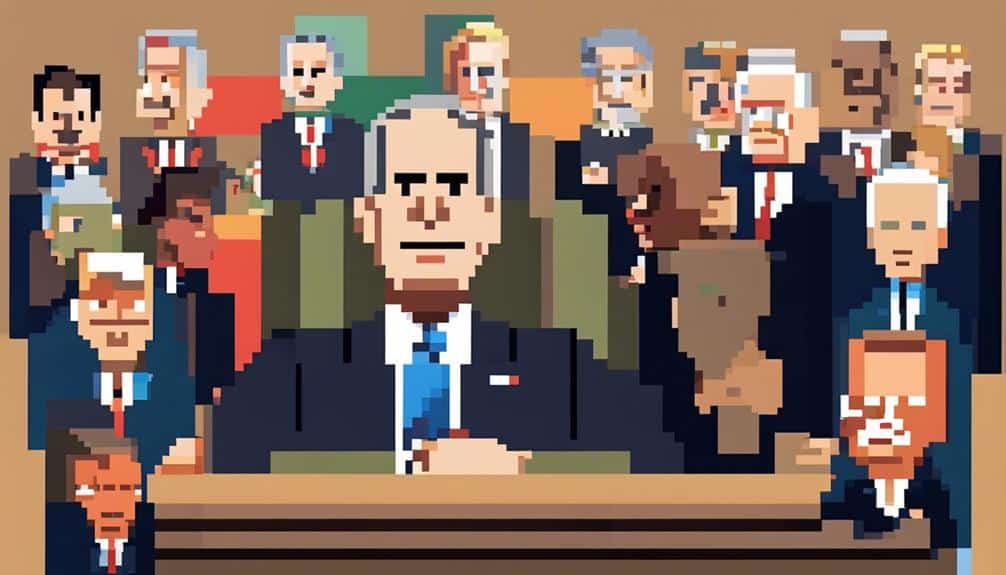
So, you think you have what it takes to navigate the choppy waters of global diplomacy? Well, buckle up because George W. Bush's diplomatic challenges were like trying to parallel park a tank in rush hour traffic.
His impact on the world stage was akin to a bull in a china shop – let's just say delicate diplomatic dances weren't his forte.
When it comes to international relations, Bush's approach could be summed up as 'diplomacy with a side of cowboy swagger'.
Bush's Diplomatic Challenges
Imagine this: Amidst the complexities of global diplomacy and international relations, George W. Bush faced significant diplomatic challenges during his presidency. Imagine yourself suddenly thrust into a room filled with world leaders speaking different languages, all while trying to navigate the murky waters of international politics. That was Bush's daily reality.
From managing relationships with allies like the UK to handling volatile situations in the Middle East, it was a diplomatic tightrope walk.
Imagine trying to explain your foreign policy decisions to skeptical nations, all while trying to keep a straight face and not accidentally pressing the wrong button. Bush had to juggle delicate negotiations with countries like Russia and China, all while trying not to mix up his diplomacy playbook with his morning coffee.
In the world of international relations, one wrong move could mean disaster. But hey, who needs sleep when you have to save the world, right?
Bush's diplomatic challenges were like a never-ending game of chess, except the pieces were real countries, and the stakes were higher than ever.
Impact on World
Mastering the complexities of global diplomacy and international relations, George W. Bush's presidency left a lasting impact on the world stage. From the controversial invasion of Iraq to the War on Terror, Bush's approach to foreign policy raised eyebrows and sparked debates worldwide. His administration's doctrine of preemption, exemplified by the Iraq War, reshaped the terrain of international relations, with consequences that are still felt today.
The infamous 'Axis of Evil' speech, grouping Iran, Iraq, and North Korea together, stirred both fear and criticism, showcasing Bush's unique brand of diplomacy. Bush's cowboy persona and bold declarations on the global stage often led to both admiration and condemnation. The Guantanamo Bay detention camp, drone strikes, and enhanced interrogation methods became hot topics in international forums, challenging traditional norms of diplomacy.
While some hailed Bush as a strong leader unafraid to take decisive action, others viewed his policies as reckless and damaging to America's image abroad. Love him or loathe him, George W. Bush's impact on the world was undeniable.
International Relations Perspective
George W. Bush's presidency greatly impacted global diplomacy and international relations through his controversial policies and bold actions on the world stage. From 'you're either with us or against us' rhetoric to the invasion of Iraq, his approach left a lasting mark on how nations interacted during his time in office.
In the field of international relations, Bush's legacy is a mixed bag of achievements and blunders, often prompting raised eyebrows and heated debates among diplomats and analysts alike.
- Coalition of the Willing: Remember when Bush rallied a questionable coalition to support the invasion of Iraq, causing a stir in the international community?
- War on Terror: The infamous declaration that changed the dynamics of global security measures, leading to widespread surveillance and counterterrorism efforts worldwide.
- Axis of Evil: Bush's bold labeling of Iraq, Iran, and North Korea as the 'axis of evil' did little to soothe tensions and foster diplomatic relations.
In the world of international relations, Bush's presidency was like a rollercoaster ride – thrilling, terrifying, and leaving you questioning if you should have just stayed home.
Legacy and Historical Impact
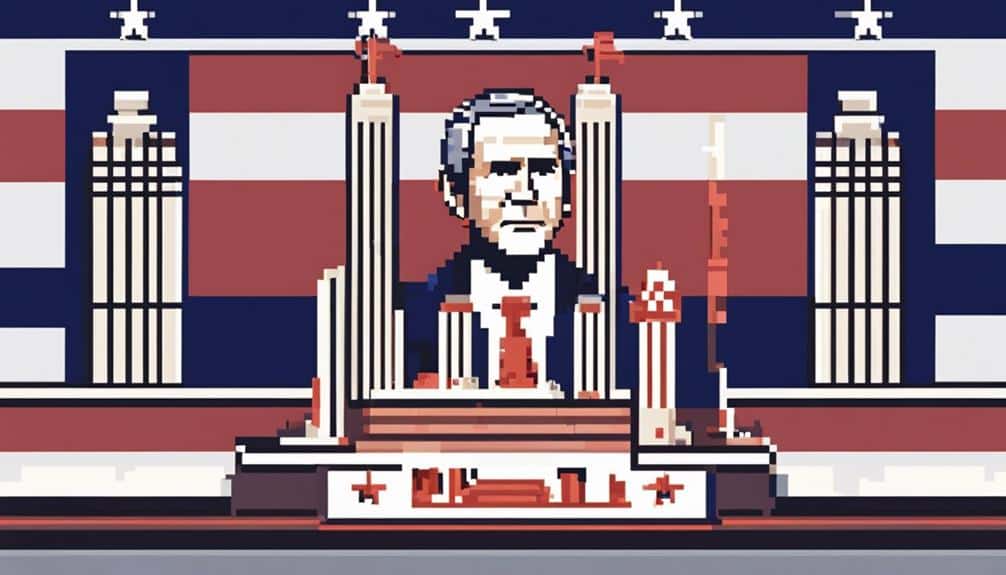
Despite facing criticism and controversies during his presidency, George W. Bush left a lasting legacy that continues to shape American history. Love him or loathe him, Bush's impact on the nation is undeniable.
His decision to invade Iraq in 2003, based on faulty intelligence about weapons of mass destruction, still reverberates in the Middle East and beyond. The creation of the Department of Homeland Security in response to the 9/11 attacks remains a cornerstone of national security infrastructure.
Bush's tax cuts, aimed at stimulating the economy, sparked debates on fiscal policy that continue to this day. His advocacy for the No Child Left Behind Act aimed to improve education standards but faced criticism for its implementation.
The financial crisis of 2008, which some attribute to deregulation policies during his tenure, further complicates his legacy.
Love him or hate him, George W. Bush's legacy is a mixed bag of triumphs and tribulations that will keep historians and analysts busy for years to come.
Post-Presidency Activities
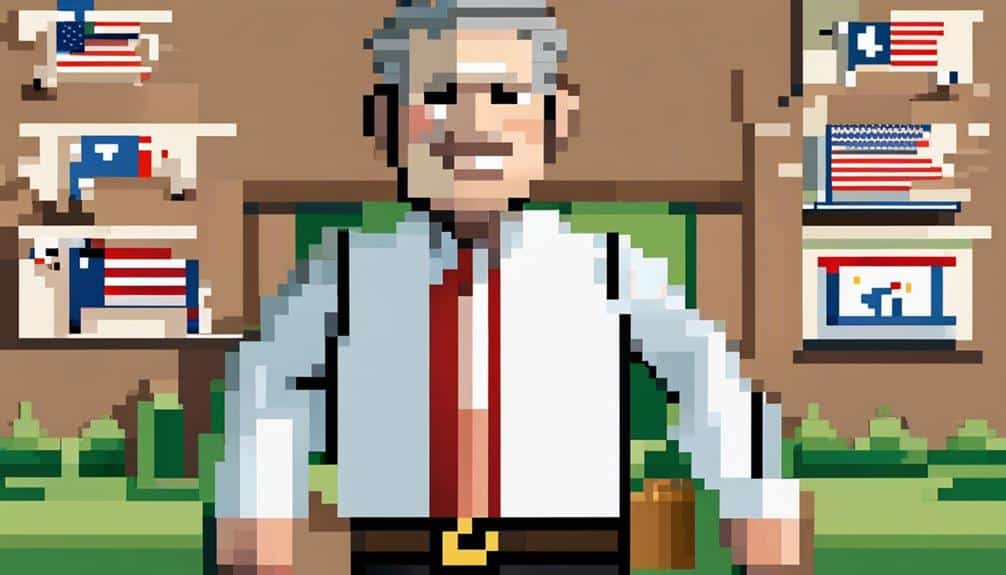
After leaving office, Bush focused on humanitarian efforts and public speaking engagements. You might think he'd retire to a life of painting or perhaps perfecting his ranch skills, but no, George W. Bush had other plans.
Here are a few highlights of his post-presidency activities:
- Founder of the George W. Bush Institute: Because why stop at just being the President when you can have an entire institute in your name?
- Writing: Not just any writing, mind you. Bush decided to pen a memoir, 'Decision Points,' giving us a glimpse into his decision-making process. Spoiler alert: it involved a lot of contemplation and maybe a few accidental button presses.
- Golfing: Yes, you read that right. Dubya took up golfing post-presidency, proving that even former leaders need a way to relax after a long day of making tough decisions. Who knew he'd a hidden talent for the sport?
Conclusion and Reflections
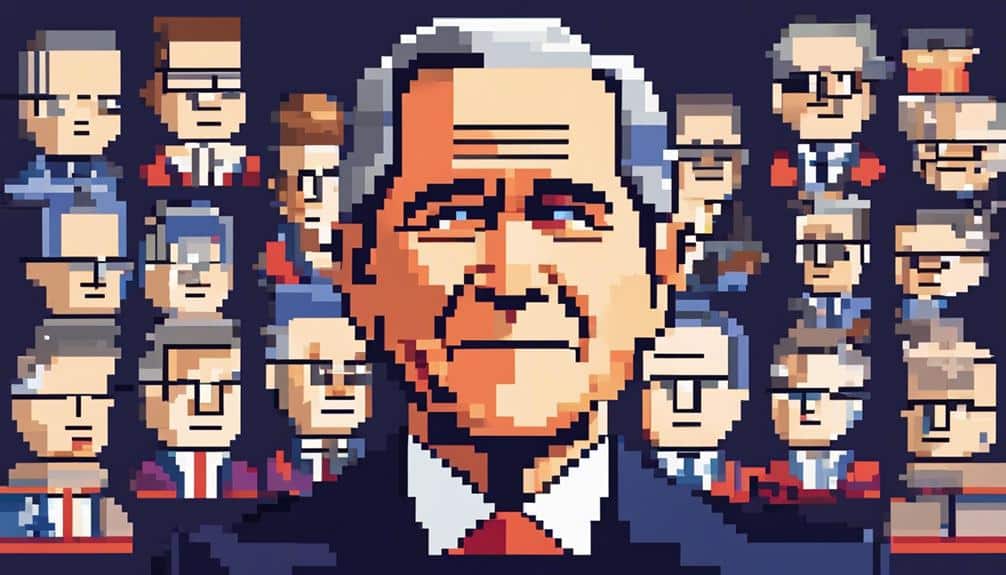
Following his departure from the presidency, George W. Bush's activities offer insights into his post-office life and a glimpse into his personal pursuits. You might be surprised to find out that this former leader has taken up painting, showcasing his artistic side with a series of portraits that have garnered both praise and raised eyebrows.
As you ponder the contrast between wielding power and a paintbrush, Bush's foray into the art world leaves you wondering if there's a hidden message in each stroke of his brush.
Moreover, Bush has also turned his attention to writing, publishing a memoir that explores his presidency with a mix of seriousness and self-deprecating humor. As you reflect on his literary pursuits, you can't help but marvel at the transformation from commander-in-chief to wordsmith.
These post-presidency endeavors by Bush serve as a reminder that life after the Oval Office can be filled with unexpected twists and turns, demonstrating that even the most underestimated individuals can surprise us all.
Conclusion
So, in the end, George W. Bush may have been misunderestimated by some, but he definitely left a lasting impact on American history.
From his famous verbal slip-ups to his controversial policies, he kept us entertained and on our toes throughout his presidency.
Love him or hate him, one thing is for sure – George W. Bush will always be remembered as a president who knew how to keep things interesting.
